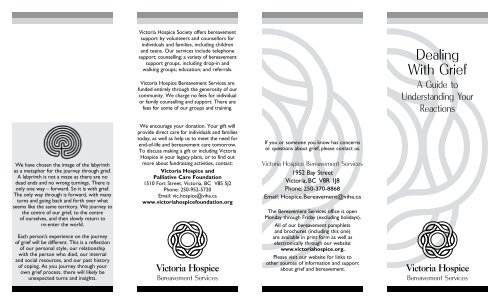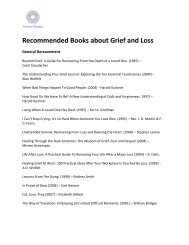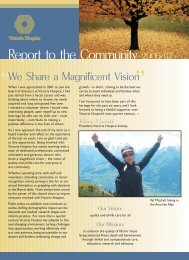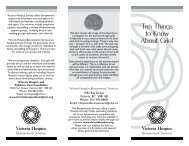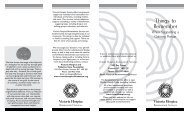Dealing with Grief. A Guide to Understanding Your - Victoria Hospice
Dealing with Grief. A Guide to Understanding Your - Victoria Hospice
Dealing with Grief. A Guide to Understanding Your - Victoria Hospice
You also want an ePaper? Increase the reach of your titles
YUMPU automatically turns print PDFs into web optimized ePapers that Google loves.
Vic<strong>to</strong>ria <strong>Hospice</strong> Society offers bereavement<br />
support by volunteers and counsellors for<br />
individuals and families, including children<br />
and teens. Our services include telephone<br />
support; counselling; a variety of bereavement<br />
support groups, including drop-in and<br />
walking groups; education; and referrals.<br />
Vic<strong>to</strong>ria <strong>Hospice</strong> Bereavement Services are<br />
funded entirely through the generosity of our<br />
community. We charge no fees for individual<br />
or family counselling and support. There are<br />
fees for some of our groups and training.<br />
<strong>Dealing</strong><br />
With <strong>Grief</strong><br />
A <strong>Guide</strong> <strong>to</strong><br />
<strong>Understanding</strong> <strong>Your</strong><br />
Reactions<br />
We have chosen the image of the labyrinth<br />
as a metaphor for the journey through grief.<br />
A labyrinth is not a maze as there are no<br />
dead ends and no wrong turnings. There is<br />
only one way – forward. So it is <strong>with</strong> grief.<br />
The only way through is forward, <strong>with</strong> many<br />
turns and going back and forth over what<br />
seems like the same terri<strong>to</strong>ry. We journey <strong>to</strong><br />
the centre of our grief, <strong>to</strong> the centre<br />
of ourselves, and then slowly return <strong>to</strong><br />
re-enter the world.<br />
Each person’s experience on the journey<br />
of grief will be different. This is a reflection<br />
of our personal style, our relationship<br />
<strong>with</strong> the person who died, our internal<br />
and social resources, and our past his<strong>to</strong>ry<br />
of coping. As you journey through your<br />
own grief process, there will likely be<br />
unexpected turns and insights.<br />
We encourage your donation. <strong>Your</strong> gift will<br />
provide direct care for individuals and families<br />
<strong>to</strong>day, as well as help us <strong>to</strong> meet the need for<br />
end-of-life and bereavement care <strong>to</strong>morrow.<br />
To discuss making a gift or including Vic<strong>to</strong>ria<br />
<strong>Hospice</strong> in your legacy plans, or <strong>to</strong> find out<br />
more about fundraising activities, contact:<br />
Vic<strong>to</strong>ria <strong>Hospice</strong> and<br />
Palliative Care Foundation<br />
1510 Fort Street, Vic<strong>to</strong>ria, BC V8S 5J2<br />
Phone: 250-952-5720<br />
Email: vic.hospice@viha.ca<br />
www.vic<strong>to</strong>riahospicefoundation.org<br />
Bereavement Services<br />
If you or someone you know has concerns<br />
or questions about grief, please contact us.<br />
Vic<strong>to</strong>ria <strong>Hospice</strong> Bereavement Services<br />
1952 Bay Street<br />
Vic<strong>to</strong>ria, BC V8R 1J8<br />
Phone: 250-370-8868<br />
Email: <strong>Hospice</strong>.Bereavement@viha.ca<br />
The Bereavement Services office is open<br />
Monday through Friday (excluding holidays).<br />
All of our bereavement pamphlets<br />
and brochures (including this one)<br />
are available in print form as well as<br />
electronically through our website:<br />
www.vic<strong>to</strong>riahospice.org.<br />
Please visit our website for links <strong>to</strong><br />
other sources of information and support<br />
about grief and bereavement.<br />
Bereavement Services
When someone important <strong>to</strong> you dies, you<br />
grieve. This means that you may experience<br />
a wide range of responses, often over an<br />
extended period of time. The following<br />
three sections generally coincide <strong>with</strong> early,<br />
middle and later grief, though variation and<br />
overlap of these phases is common.<br />
When a death occurs<br />
When a death occurs<br />
Walking the Edges<br />
Social<br />
Withdrawal from others<br />
Unrealistic expectations of self and others<br />
Poor judgement about relationships<br />
The <strong>Grief</strong> Journey<br />
Adjusting <strong>to</strong> loss<br />
Entering the Depths<br />
Social<br />
Rushing in<strong>to</strong> new relationships<br />
Wanting company but unable <strong>to</strong> ask<br />
Continued <strong>with</strong>drawal and isolation<br />
Self-consciousness<br />
As life goes on<br />
Social<br />
Mending the Heart<br />
More interest in daily affairs of self/others<br />
Ability <strong>to</strong> reach out and meet others<br />
Energy for social visits and events<br />
As you accept the fact of the death of<br />
someone important, you will feel shock,<br />
numbness and disbelief that this has<br />
happened. Panic and strong physical and<br />
emotional reactions are common.<br />
Physical<br />
Shortness of breath and palpitations<br />
Digestive upsets<br />
Low energy, weakness and restlessness<br />
Physical<br />
Changes in appetite and sleep patterns<br />
Shortness of breath and palpitations<br />
Digestive upsets<br />
Physical<br />
Physical symp<strong>to</strong>ms subside<br />
Sleep pattern and appetites are more settled<br />
Gut-wrenching emptiness lightens<br />
Adjusting <strong>to</strong> loss<br />
Later, as the numbness subsides, you will deal<br />
<strong>with</strong> what this loss means <strong>to</strong> you and the<br />
emotional pain of grieving. The intensity of<br />
feeling may surprise or frighten you, but it is<br />
natural and can be resolved as you move<br />
through it.<br />
As life goes on<br />
As you adjust <strong>to</strong> life <strong>with</strong>out the person who<br />
died, you will begin <strong>to</strong> re-establish connections<br />
<strong>with</strong> the world around you. You have more<br />
energy for family and friends, work and other<br />
interests.<br />
<strong>Grief</strong> may be somewhat familiar, or it may<br />
be a new, uncertain endeavour. It is not an<br />
easy journey and there may be times when<br />
you want more support than is available<br />
through your social network. Please do<br />
not hesitate <strong>to</strong> call Bereavement Services<br />
at Vic<strong>to</strong>ria <strong>Hospice</strong>.<br />
Emotional<br />
Crying, sobbing and wailing<br />
Indifference and emptiness<br />
Outrage and helplessness<br />
Mental<br />
Confusion, forgetfulness and poor<br />
concentration<br />
Denial and daydreaming<br />
Constant thoughts about the person who<br />
died and/or the death<br />
Spiritual<br />
Blaming God or life<br />
Lack of meaning, direction or hope<br />
Wanting <strong>to</strong> die or join the person who died<br />
What Helps<br />
• To pace yourself moment <strong>to</strong> moment<br />
• To make no unnecessary changes<br />
• To talk about the person and the death<br />
• To use practical and emotional supports<br />
Emotional<br />
Intense and conflicting emotions<br />
Magnified fear for self or others<br />
Anger, sadness, guilt, depression<br />
Mental<br />
Sense of going crazy<br />
Memory problems<br />
Difficult <strong>to</strong> concentrate/understand<br />
Vivid dreams or nightmares<br />
Spiritual<br />
Trying <strong>to</strong> contact the person who died<br />
Sensing the presence of the person who<br />
died; visitations<br />
Continued lack of meaning<br />
What Helps<br />
• To recognize and express emotions<br />
• To acknowledge changes<br />
• To understand grief and know others<br />
experience similar responses<br />
Emotional<br />
Emotions are less intense<br />
Feeling of coming out of the fog<br />
More peace; less guilt<br />
Mental<br />
Increased perspective about the death<br />
Ability <strong>to</strong> remember <strong>with</strong> less pain<br />
Improved concentration and memory<br />
Dreams and nightmares decrease<br />
Spiritual<br />
Reconnection <strong>with</strong> religious/spiritual beliefs<br />
Life has new meaning and purpose<br />
Acceptance of death as part of life cycle<br />
What Helps<br />
• To reflect on progress since the death<br />
• To begin envisioning a future<br />
• To engage in new activities<br />
• To establish new roles and relationships<br />
Adapted from: <strong>Grief</strong>, Dying and Death by T. Rando


